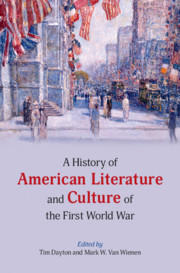Book contents
- A History of American Literature and Culture of the First World War
- A History of American Literature and Culture of the First World War
- Copyright page
- Contents
- Figures
- Contributors
- Acknowledgments
- Introduction America’s Great War at One Hundred (and Counting)
- Part I Genre and Medium
- Part II Settings and Subjects
- Chapter 9 The Peace Movement
- Chapter 10 Americans in France
- Chapter 11 German Americans
- Chapter 12 The English in America
- Chapter 13 Preparedness
- Chapter 14 Propaganda
- Chapter 15 Conscientious Objectors
- Chapter 16 Volunteers
- Chapter 17 African Americans
- Chapter 18 In the Midwest
- Chapter 19 In the South
- Chapter 20 Revolution
- Chapter 21 Monuments and Memorials
- Part III Transformations
- References
- Index
Chapter 11 - German Americans
Dual Loyalties and Poetic Adaptations of “The Watch on the Rhine”
from Part II - Settings and Subjects
Published online by Cambridge University Press: 23 January 2021
- A History of American Literature and Culture of the First World War
- A History of American Literature and Culture of the First World War
- Copyright page
- Contents
- Figures
- Contributors
- Acknowledgments
- Introduction America’s Great War at One Hundred (and Counting)
- Part I Genre and Medium
- Part II Settings and Subjects
- Chapter 9 The Peace Movement
- Chapter 10 Americans in France
- Chapter 11 German Americans
- Chapter 12 The English in America
- Chapter 13 Preparedness
- Chapter 14 Propaganda
- Chapter 15 Conscientious Objectors
- Chapter 16 Volunteers
- Chapter 17 African Americans
- Chapter 18 In the Midwest
- Chapter 19 In the South
- Chapter 20 Revolution
- Chapter 21 Monuments and Memorials
- Part III Transformations
- References
- Index
Summary
German immigrant poets in the United States wrote and published many poems in 1914-1915 that conveyed patriotism for their country of birth and support for the German war effort. They expressed their German sympathies in part by drawing on nineteenth-century German patriotic poetry, borrowing or refashioning elements of one poem in particular, Max Schneckenberger’s “The Watch on the Rhine” (“Die Wacht am Rhein”). Originally published in 1840, this poem served as an anthem of sorts for German Americans during the early months of the Great War and is a key text for understanding German-American poetry and culture. This chapter discusses several examples of poems that reference Schneckenberger’s text The poems help us recognize how German-American poets, and German Americans more generally, defined and projected their national identity early in the war, when they could maintain dual loyalties to Germany and the United States. The poetry also suggests that rampant anti-German sentiment would soon motivate the immigrant poets to suppress manifestations of their allegiance and cultural ties to the European homeland.
Keywords
- Type
- Chapter
- Information
- Publisher: Cambridge University PressPrint publication year: 2021



